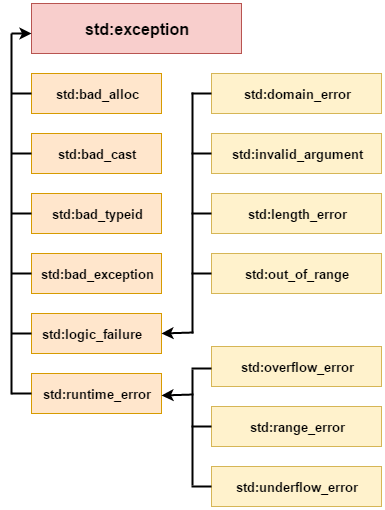📌 相关文章
- F#异常处理
- C#异常处理
- C#-异常处理(1)
- F#异常处理(1)
- C++中的异常处理(1)
- C#-异常处理
- F#-异常处理(1)
- 异常处理 (1)
- C#异常处理(1)
- 处理异常 (1)
- C++异常处理(1)
- C++异常处理
- F#-异常处理
- C++中的异常处理
- C#中的异常处理(1)
- C++中的异常处理
- Python异常处理(1)
- Python 3-异常处理
- Python 3-异常处理(1)
- Python异常处理
- Python异常处理
- Python异常处理
- 硒异常处理python(1)
- Python | 异常处理
- JavaScript中的异常处理(1)
- JavaScript中的异常处理
- 如何处理异常 (1)
- Java中的异常处理(1)
- Java中的异常处理
📜 C++异常处理
📅 最后修改于: 2020-10-16 07:15:01 🧑 作者: Mango
Throw
C++异常处理
C++中的异常处理是处理运行时错误的过程。我们执行异常处理,因此即使在运行时错误之后,也可以保持应用程序的正常流程。
在C++中,异常是在运行时引发的事件或对象。所有异常均源自std :: exception类。这是可以解决的运行时错误。如果我们不处理异常,它将打印异常消息并终止程序。
优点
它保持了应用程序的正常流程。在这种情况下,即使在异常发生后,其余代码也会执行。
C++异常类
在C++中,标准例外是在

C++中的所有异常类均源自std :: exception类。让我们看一下C++常见异常类的列表。
| Exception | Description |
|---|---|
| std::exception | It is an exception and parent class of all standard C++ exceptions. |
| std::logic_failure | It is an exception that can be detected by reading a code. |
| std::runtime_error | It is an exception that cannot be detected by reading a code. |
| std::bad_exception | It is used to handle the unexpected exceptions in a c++ program. |
| std::bad_cast | This exception is generally be thrown by dynamic_cast. |
| std::bad_typeid | This exception is generally be thrown by typeid. |
| std::bad_alloc | This exception is generally be thrown by new. |
C++异常处理关键字
在C++中,我们使用3个关键字执行异常处理:
- try
- catch
- throw
此外,我们可以创建用户定义的异常,我们将在下一章中学习。